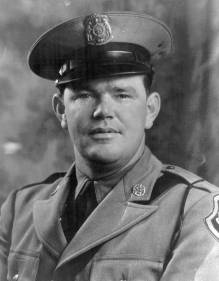
Trooper Charles P. Corbin
Trooper Charles P. Corbin
On September 15, 1943, Trooper Charles P. Corbin was on patrol accompanied by Public Service Commission Inspector Ed Bilyeau north of Carthage on U.S. Highway 71 when a transport truck and trailer traveling on the wrong side of the roadway struck his patrol car. Tpr. Corbin met the truck on a bridge as the truck struck the bridge and jackknifed into the path of the patrol car. Tpr. Corbin was killed instantly and Inspector Bilyeau was critically injured. The driver of the truck, Alfred Vastings, was held and charged with manslaughter, but the charge was dismissed.
Trooper Charles P. Corbin, 27, was the fourth officer to be killed in the line of duty. He was survived by his wife and a son. (His son, G. Paul Corbin, became a member of the Patrol in 1966, and retired as a captain in 1994.)
This touching account was provided by Trooper Corbin's son; Paul Corbin
When my dad was killed on September 15, 1943, he was assigned the Carthage Zone in Troop D. It was a busy zone with WW II war related activities compounded by the two major Army installations nearby at Camp Crowder in Neosho and Camp Clark at Nevada demanding much of the Troopers' attention during their 12 hour shifts with 4 days a month off.
Crowder was the U.S. Army's Signal Corps Training Center and Clark was an Army's Prisoner of War installation for German and Italian POWs. Troopers in the Zone were involved with the many soldiers from Crowder going AWOL, drunk driving etc. and POWs from Clark escaping. He was also working with the Public Service Commission (PSC) on illegal transportation of black marketed rationed goods on US 66 and US 71 in Jasper County.
The latter was what he was doing on the night that he was killed and PSC Inspector Ed Belyeu was severely injured. Belyeu was a passenger in dad's Patrol car at the time. They were following a north bound tractor trailer on US 71, 3 miles north of Carthage at 1:00 AM, when a south bound tractor trailer driven by a 21 year old driver struck a concrete bridge abutment causing the vehicle to jack knife in the immediate path of my dad's Patrol car on a narrow two lane bridge. Speculation was the driver had fallen asleep at the wheel and drifted off the right side of the roadway.
As providence would have it, immediately following the Patrol car were six doctors in a passenger car who were in route to KCMO for a medical convention. They told investigating Troopers that my dad was killed instantly in the crash and that they gave first aid to Inspector Belyeu, who had survived but was in very serious condition (he remained in a local hospital for over 6 weeks after the crash...and subsequently was hired by the Patrol as a weight inspector where he remained until his death of natural causes in the early 1970's. He wore a leg brace and used crutches for the rest of his life after the crash).
After the crash, an officer from the Carthage Police Department telephoned my mom at home and told her my dad was dead. This was before two Troopers from the Patrol could get there and tell her in person. When they arrived at our house on North Garrison Street, mom was hysterical and couldn't answer the door. The Troopers had to break the door down to get in to aid and comfort mom (she was 29 at the time and dad had been 27).
Mom was a stay at home mother with a 15 month old baby (me) and a 12 year old daughter from a previous marriage. Mom was unskilled and only had an 8th grade education. After the death of my dad, she took the only job she could find which was working in a laundry in Carthage. My dad had no life insurance, no workman's comp was available for MO State employees then, and the Missouri Association of State Troopers Relief Society (MASTERS) would not emerge until about 25 years later. Nor was there the US BJA's Public Safety Officers' Benefits Program that is available today to financially assist widows and children of fallen officers (that was started in 1976).
The only benefit she got from the Patrol was a statewide collection from MSHP Troopers and Radio Operators of $500.00. However, from that she had to pay $365.00 for the funeral. My dad's brother wrote a letter to the Patrol asking if the Patrol could pay for the uniforms my dad still owed for at the time of the crash and it was denied (records indicate the Superintendent at the time did not want to "set a precedent").
Mom remained in Carthage until the following summer of 1944, until my sister was out of school. She then boarded a Grey Hound bus with my sister and me and moved to Cape Girardeau, MO to live with her widowed mother in a small three room home which did not have indoor facilities or running water. We were literally left "dirt poor". Mom went to work in the Cape International Shoe Factory on an assembly line making shoes. She remarried in 1949.
MASTERS would also like to note that Paul Corbin had a long and very successful career with the Missouri State Highway Patrol retiring at the rank of Captain. After retirement, Captain Corbin served as the Colonel of the Nevada Highway Patrol, Chief of Police in Saint Charles, Missouri, and is currently Associate Professor of Criminal Justice at Lindenwood University.
Without question we know that Trooper Corbin is certainly proud of his son for the wonderful person he became, his career successes, and his longtime membership and support of The MASTERS.

